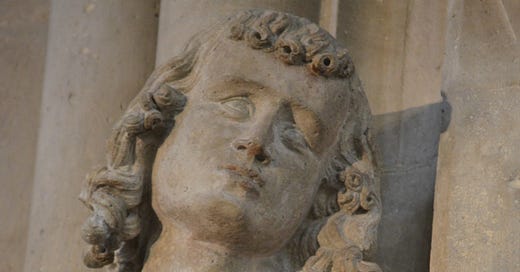And We're Back . . . with a pleu for all who write on Germany
Dear Friends, it’s been a long time since we set sail! Though I’m heartened to find that it wasn’t yet a full year ago that I launched this page, with the optimistic hopes of cleaving some brine in the public sphere.
I did in fact cleave the brine — all too reelingly — in the intervening months, and have in fact been holding up this page in my mind’s eye as a reward for completing the several pressing writing tasks that have been on my docket since last spring. The last one is still, alas, in progress, but I’ll likely report on one or more of these here once that’s off my plate. And there have been many other things I want to reflect on more too — the impromptu tour of Melville-related sites in New York City that I dragged my family to in May; the weird and magical Alpine pilgrimage church we discovered during a short research trip to Austria and Germany in November; a truly sublime music experience provided by a Metallica cover band whose name I don’t know in a dive bar in Astoria, Queens. But I need more free head-space to write about those topics.
Meanwhile, a more pressing and easy-to-articulate issue came to the front of my mind last night, while I was reading an otherwise magnificent article by a brilliant young scholar in a leading academic journal. It included a spelling tic that I have seen over and over again in English-language scholarship (including very widely-read books by established senior scholars) since the late 1980s. It always drives me bananas, and it prompted me to make this public pleu.
“A pleu?” you say, maybe looking confused and a little annoyed like Margrave Herman in the west choir of a certain east-German cathedral. “What the heck is that?” Well, I meant “plea,” of course, and surely you got that from context. It’s just one letter, and in normal handwriting (printing) they even look similar, with the curved bottom and straight line on the right side. Not a big deal.
But it looks weird, right? Distracting. And I know that I shouldn’t come here and be all school-marm spelling-police — especially after such a long hiatus, and especially after invoking my idol Herman Melville, who was a notoriously terrible speller all throughout his life. (His wife, Elizabeth, rendered all of his sloppy manuscript pages into readable, properly spelled text for the printer.) But here goes:
To all primarily English-speaking people who write and publish — scholars, art historians, medievalists, EDITORS (please please please, copy-editors, I beg you, this is on you as much as anyone), anyone who has any occasion to make reference to cities or towns in German-speaking lands — please, I beg you, make a note of this: the endings -BURG and -BERG are not interchangeable.
They have different pronunciations and distinct meanings. They open up different stories about their places. -BURG (pronounced “boorg”) indicates that this was the site of a castle or other fortified area. (By the late Middle Ages, Burg was just the term for a town, most of them being assumed to be fortified anyway — hence the word Bürger (our burgher) for citizen.) -BERG (pronounced “bairg”) points to the presence of a mountain or hill.
The first parts of place names sometimes reflect the muddled nature of oral speech over the centuries, before the place names became really codified in written language. So a name like, oh, Naumburg is probably a mushed-up version of “new castle” (neue Burg) because the town developed around a new castle that was established in the 11th century by the father of Herman (pictured above, as he was envisioned in the mid-13th c). The origin of Nürnberg (only a mountain?) is uncertain, but the toponym refers to some aspect of the hill and not the now-famous castle.
Others are crystal clear. The name Salzburg (salt castle) refers to the fact that the episcopal foundation that would become the city was dependent on the salt-mining industry. They could have called it Salzberg for the mountain(s) that yielded the resources, but from the 8th century onward it was the interrelation of the human community (Burg) and the salt that they wanted to stress. The town of Freiberg (free mountain) in Saxony went the former route, highlighting the mountain range (the nearby Erzgebirge) that was a major mining site then and now. By contrast, the town of Freiburg, on the Rhine river, chose to emphasize its status as a free and independent civic entity. (There are actually several medieval towns that boasted that name — hence the specification Freiburg-im-Breisgau for the university town on the Rhine. There is also Fribourg in Switzerland, which has the same meaning.)
I get that in American and British English we don’t pay much attention to -berg vs -burg. We readily pronounce both vowel sounds like “bird.” And yes, when I see the word “Naumberg” used for the place where Uta and Eckehard live, I know what you’re talking about. But it’s kind of like seeing someone write about New Yark. Or Chicugo. Les Angeles. Londin. Place names carry history and identity. Spelling them right matters.
(If you’re at all in doubt, or if you know you always get them mixed up — it’s easy to do that, especially if Germany is not your central area of focus — it’s worthwhile to just double-check in a German dictionary. It is a small effort that will really make a big difference to readers. Copy-editors, take heed!)




